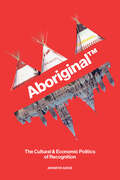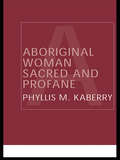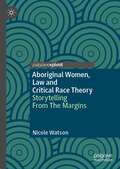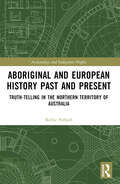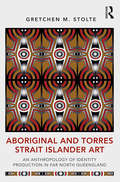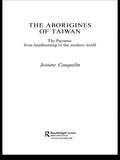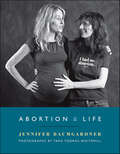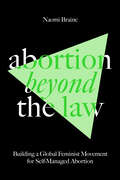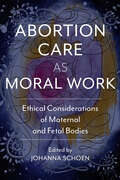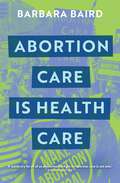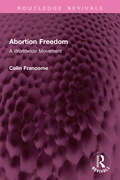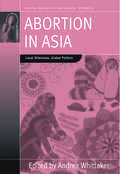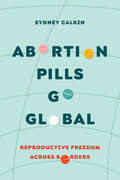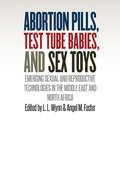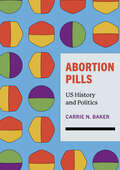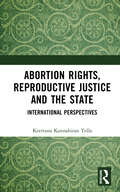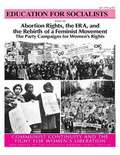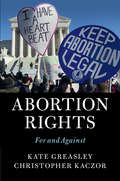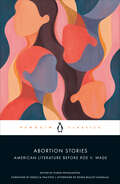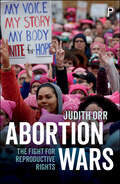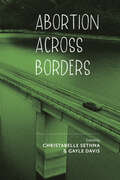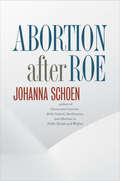- Table View
- List View
Aboriginal TM: The Cultural and Economic Politics of Recognition
by Jennifer AdeseIn Aboriginal™, Jennifer Adese explores the origins, meaning, and usage of the term “Aboriginal” and its displacement by the word “Indigenous.” In the Constitution Act, 1982, the term’s express purpose was to speak to specific “aboriginal rights”. Yet in the wake of the Constitution’s passage, Aboriginal, in its capitalized form, became increasingly used to describe and categorize people. More than simple legal and political vernacular, the term Aboriginal (capitalized or not) has had real-world consequences for the people it defined. Aboriginal™ argues the term was a tool used to advance Canada’s cultural and economic assimilatory agenda throughout the 1980s until the mid-2010s. Moreover, Adese illuminates how the word engenders a kind of “Aboriginalized multicultural” brand easily reduced to and exported as a nation brand, economic brand, and place brand—at odds with the diversity and complexity of Indigenous peoples and communities. In her multi-disciplinary research, Adese examines the discursive spaces and concrete sites where Aboriginality features prominently: the Constitution Act, 1982; the 2010 Vancouver Olympics; the “Aboriginal tourism industry”; and the Vancouver International Airport. Reflecting on the term’s abrupt exit from public discourse and the recent turn toward Indigenous, Indigeneity, and Indigenization, Aboriginal™ offers insight into Indigenous-Canada relations, reconciliation efforts, and current discussions of Indigenous identity, authenticity, and agency.
Aboriginal Woman Sacred and Profane
by Phyllis KaberryFirst published in 1939 by Routledge, this classic ethnography portrays the aboriginal woman as she really is - a complex social personality with her own prerogatives, duties, problems, beliefs, rituals and point of view. This groundbreaking and enduring study was researched in North-West Australia between 1935 and 1936 and was written by a woman who truly pioneered the study of gender in anthropology
Aboriginal Women, Law and Critical Race Theory: Storytelling From The Margins (Palgrave Studies in Race, Ethnicity, Indigeneity and Criminal Justice)
by Nicole WatsonThis book explores storytelling as an innovative means of improving understanding of Indigenous people and their histories and struggles including with the law. It uses the Critical Race Theory (‘CRT’) tool of ‘outsider’ or ‘counter’ storytelling to illuminate the practices that have been used by generations of Aboriginal women to create an outlaw culture and to resist their invisibility to law. Legal scholars are yet to use storytelling to bring the experiential knowledge of Aboriginal women to the centre of legal scholarship and yet this book demonstrates how this can be done by way of a new methodology that combines elements of CRT with speculative biography. In one chapter, the author tells the imagined story of Eliza Woree who featured prominently in the backdrop to the decision of the Supreme Court of Queensland in Dempsey v Rigg (1914) but whose voice was erased from the judgements. This accessible book adds a new and innovative dimension to the use of CRT to examine the nexus between race and settler colonialism. It speaks to those interested in Indigenous peoples and the law, Indigenous studies, Indigenous policy, Aboriginal and Torres Strait Islander history, feminist studies, race and the law, and cultural studies.
Aboriginal and European History Past and Present: Truth-telling in the Northern Territory of Australia (Archaeology and Indigenous Peoples)
by Kellie PollardThis book analyses the 150-year history of continuous contact between Aboriginal people and non-Aboriginal people in the Darwin region of the Northern Territory of Australia after the European invasion in 1869 to the present day.It explores the role Aboriginal fringe camps served, and still do, as places of interface between Aboriginal people and non-Aboriginal people in the context of ongoing colonialism after colonisation. The book argues that Aboriginal fringe camps provide much potential for elucidating aspects of Aboriginal responses to the European invasion and, in a contemporary context, bear distinct evidence of a cultural nature that associates their origins, use, purpose, and functions predominantly with Aboriginal people. It contributes a new and innovative theoretical model that will enable readers to conceive how insights about Aboriginal behaviour in the context of Aboriginal fringe camps were achieved. The model is informed by the frameworks of colonialism and, innovatively, philosophy.Contributing new theoretical knowledge to contact histories and relations between Europeans and Indigenous peoples, the book will be important to researchers in the archaeology of Australia and those concerned with Indigenous Studies.
Aboriginal and Torres Strait Islander Art: An Anthropology of Identity Production in Far North Queensland (Criminal Practice Ser.)
by Gretchen M. StolteAboriginal and Torres Strait Islander Art explores the effects of Queensland government policies on urban First Nation artists. While such art has often been misinterpreted as derivative lesser copies of ‘true’ Indigenous works, this book unveils new histories and understandings about the mixed legacy left for Queensland Indigenous artists. Gretchen Stolte uses rich ethnographic detail to illuminate how both Aboriginal and Torres Strait Islander artists understand and express their heritage. She specifically focuses on artwork at the Aboriginal and Torres Strait Islander art studio in the Tropical North Queensland College of Technical and Further Education (TNQT TAFE), Cairns. Stolte's ethnography further develops methodologies in art history and anthropology by identifying additional methods for understanding how art is produced and meaning is created.
Aboriginal and Torres Strait Islander Education
by Kaye PriceAboriginal and Torres Strait Islander Education: An Introduction for the Teaching Profession prepares students for the classroom and community environments they will encounter when teaching Aboriginal and Torres Strait Islander children in urban, rural and remote schools at early childhood, primary and secondary levels. The book addresses many issues and challenges faced by teacher education students and assists them to understand the deeper social, cultural and historical context of Aboriginal and Torres Strait Islander education. This is a unique textbook written by a team of highly regarded Aboriginal and Torres Strait Islander academics. Each chapter opens with an engaging anecdote from the author, connecting learning to real-world issues. This is also the first textbook to address Torres Strait Islander education. Written in an engaging and accessible style, Aboriginal and Torres Strait Islander Education is an essential resource for teacher education students.
Aborigines of Taiwan: The Puyuma: From Headhunting to the Modern World
by Josiane CauquelinBased on extensive field research over a period of twenty years, this is the first comprehensive study of the Puyuma people of Taiwan. The Puyuma belong to the Austronesian peoples, which today number less than 370,000. In Taiwan, they are the least known of the aboriginal groups, numbering only 6000, and inhabiting the Southeastern province of Taitung. The study looks at the historical changes in the status and definition of these people in relation to the central state, the criteria by which people determine their own ethnic identity, and the evolution of that identity through history. The increasing awareness in the West of the importance of ethnic relations makes this an especially timely book.
Abortion & Life
by Jennifer BaumgardnerBaumgardner’s groundbreaking new book includes abortion testimonials by Ani DiFranco, Barbara Ehrenreich, Gloria Steinem, and others.“In her role as author and activist, Jennifer Baumgardner has permanently changed the way people think about feminism . . . and will shape the next hundred years of politics and culture.” —The Commonwealth Club of California, hailing Baumgardner as one of Six Visionaries for the Twenty-First CenturyIn Abortion & Life, author and activist Jennifer Baumgardner reveals how the most controversial and stigmatized Supreme Court decision of our time cuts across eras, classes, and race. Stunning portraits by photographer Tara Todras-Whitehill of folk singer Ani DiFranco, authors Barbara Ehrenreich and Gloria Steinem, and others accompany their elucidating accounts of their own abortion experiences.In this bold new work, Baumgardner explores some of the thorniest issues around terminating a pregnancy, including the ones that the pro-choice establishment has been the least sensitive or effective in confronting.
Abortion Beyond the Law: Building a Global Feminist Movement for Self-Managed Abortion
by Naomi BraineHow feminists across Latin America, Africa, and Europe are making self-managed abortion available to all–and the strong transnational feminist movement they have built along the wayThe feminists across Latin America, Africa, and Europe making self-managed abortion available to all - and the transnational movement they have built along the wayDrawing on years of research with activists around the world, sociologist Naomi Braine describes the strategies, politics, and tactics of direct action feminists bringing abortion pills, information, and support to people seeking to end unwanted pregnancies. From combatting the legal strictures of Bolsonaro's Brazil, to navigating the NGO-dominated landscape of Kenya and Nigeria, feminist activists are making safe, accessible abortion care available against the odds.Even more important, these women are building a robust transnational feminist network. Tactics developed in the Global South - hotlines, practices of accompaniment and peer-to-peer care, and scientific information - are now being shared with activists in Europe and North America, building a new model for international feminist solidarity.
Abortion Care as Moral Work: Ethical Considerations of Maternal and Fetal Bodies (Critical Issues in Health and Medicine)
by Shannon Withycombe Colin Partridge Curtis Boyd Glenna Boyd Renee Chelian Thomas Cunningham Sarah Dubow Marc Heller Amy Hagstrom Miller Shelley SellaAbortion Care as Moral Work brings together the voices of abortion providers, abortion counselors, clinic owners, neonatologists, bioethicists, and historians to discuss how and why providing abortion care is moral work. The collection offers voices not usually heard as clinicians talk about their work and their thoughts about life and death. In four subsections--Providers, Clinics, Conscience, and The Fetus--the contributions in this anthology explore the historical context and present-day challenges to the delivery of abortion care. Contributing authors address the motivations that lead abortion providers to offer abortion care, discuss the ways in which anti-abortion regulations have made it increasingly difficult to offer feminist-inspired services, and ponder the status of the fetus and the ethical frameworks supporting abortion care and fetal research. Together these essays provide a feminist moral foundation to reassert that abortion care is moral work.
Abortion Care is Health Care
by Barbara BairdIn Abortion Care is Health Care Barbara Baird tells the history of the provision of abortion care in Australia since 1990. Against the backdrop of a reticent public sector Baird describes a system of predominantly private provision, which has excluded women already marginalised by poverty, rural and remote residency, lack of Medicare entitlement, racism and other factors. Tracing changes in the private sector, the long struggle to make medical abortion available and the nationwide decriminalisation of abortion since 2002, Baird introduces readers to the large cast of 'champions' and everyday healthcare workers and activists who have persisted in their commitment to make abortion care available when governments and the medical profession have so often failed. Drawing on oral history interviews conducted nationwide with abortion-providing doctors, nurses, counsellors and managers, women's health workers, academics and community activists, Baird brings a critical feminist analysis to create a sophisticated historical narrative of abortion provision over the last thirty years.
Abortion Freedom: A Worldwide Movement (Routledge Revivals)
by Colin FrancomeFirst published in 1984, Abortion Freedom explains the main reasons for widespread international liberalisation of abortion laws. Colin Francome points out that the birth control movement had its roots in a concern with overpopulation and that this is still a crucial issue today. A major change, however, is that whereas in the early days the socialists were often opposed to birth control they are now amongst the keenest supporters of the woman’s right to choose. The author pays particular attention to the debates in the United States, France and Italy. It is aimed primarily at students of politics, sociology and law but it has a much wider appeal to the general public as a readable explanation of the ideas and strategies of the opposing forces involved.
Abortion In Asia
by Andrea WhittakerThe issue of abortion forces a confrontation with the effects of poverty and economic inequalities, local moral worlds, and the cultural and social perceptions of the female body, gender, and reproduction. Based on extensive original field research, this provocative collection presents case studies from Thailand, Cambodia, Burma, Vietnam, Bangladesh, Indonesia, and India. It includes powerful insight into the conditions and hard choices faced by women and the circumstances surrounding unplanned pregnancies. It explores the connections among poverty, violence, barriers to access, and the politics and strategies involved in abortion law reform. The contributors analyze these issues within the broader conflicts surrounding women's status, gender roles, religion, nationalism and modernity, as well as the global politics of reproductive health.
Abortion Pills Go Global: Reproductive Freedom across Borders (Reproductive Justice: A New Vision for the 21st Century #7)
by Dr. Sydney CalkinAn unprecedented, up-close look into the global self-managed abortion movement. Abortion pills have made safe medication abortion possible for millions of people around the world, even in the most restrictive circumstances. In this timely book, Sydney Calkin illustrates the profound, transformative promise of these pills—which are safe, effective, and responsible for a sharp decline in maternal mortality. Abortion Pills Go Global demonstrates that the widespread practice of self-managed medication abortion makes it more difficult for countries to enforce oppressive abortion laws and less willing to do so. Taking a bold and unique geographic approach, this book follows these pills as they are manufactured and transported by feminist activists from India to Ireland, Northern Ireland, Poland, and the United States. Calkin shows that the growing availability of abortion pills in places with restrictive laws means more people have access to self-managed healthcare. Abortion Pills Go Global looks ahead to see how the broader politics of abortion could shift in response to this global movement—one that looks not to laws for protection but to on-the-ground feminist mobilizations across borders.
Abortion Pills, Test Tube Babies, and Sex Toys: Emerging Sexual and Reproductive Technologies in the Middle East and North Africa
by L. L. Wynn Angel M. FosterFrom Viagra to in vitro fertilization, new technologies are rapidly changing the global face of reproductive health. They are far from neutral: religious, cultural, social, and legal contexts condition their global transfer. The way a society interprets and adopts (or rejects) a new technology reveals a great deal about the relationship between bodies and the body politic. Reproductive health technologies are often particularly controversial because of their potential to reconfigure kinship relationships, sexual mores, gender roles, and the way life is conceptualized. This collection of original ethnographic research spans the region from Morocco and Tunisia to Israel and Iran and covers a wide range of technologies, including emergency contraception, medication abortion, gamete donation, hymenoplasty, erectile dysfunction, and gender transformation.
Abortion Pills, Test Tube Babies, and Sex Toys: Emerging Sexual and Reproductive Technologies in the Middle East and North Africa
by L. L. Wynn and Angel M. FosterFrom Viagra to in vitro fertilization, new technologies are rapidly changing the global face of reproductive health. They are far from neutral: religious, cultural, social, and legal contexts condition their global transfer. The way a society interprets and adopts (or rejects) a new technology reveals a great deal about the relationship between bodies and the body politic. Reproductive health technologies are often particularly controversial because of their potential to reconfigure kinship relationships, sexual mores, gender roles, and the way life is conceptualized. This collection of original ethnographic research spans the region from Morocco and Tunisia to Israel and Iran and covers a wide range of technologies, including emergency contraception, medication abortion, gamete donation, hymenoplasty, erectile dysfunction, and gender transformation.Table of ContentsAcknowledgments Introduction | Setting the Context: Sexuality, Reproductive Health, and Medical Technologies in the Middle East and North Africa Angel M. Foster and L. L. Wynn Part I | Preventing and Terminating PregnancyIs There an Islamic IUD? Exploring the Acceptability of a Hormone-Releasing Intrauterine Device in Egypt Ahmed Ragaa A. RagabIntroducing Emergency Contraception in Morocco: A Slow Start after a Long Journey Elena ChopyakMifepristone in Tunisia: A Model for Expanding Access to Medication Abortion Angel M. FosterNavigating Barriers to Abortion Access: Misoprostol in the West Bank Francoise Daoud and Angel M. Foster Part II | Achieving Pregnancy and Parenthood"Worse comes to worst, I have a safety net": Fertility Preservation among Young, Single, Jewish Breast Cancer Patients in Israel Daphna Birenbaum-Carmeli, Efrat Dagan, and Suzi Modiano GattegnoThe "ART" of Making Babies Using In Vitro Fertilization: Assisted Reproduction Technologies in the United Arab Emirates Shirin KarsanWanted Babies, Excess Fetuses: The Middle East's In Vitro Fertilization, High-Order Multiple Pregnancy, Fetal Reduction Nexus Marcia C. InhornBirthing Bodies, Pregnant Selves: Gestational Surrogates, Intended Mothers, and Distributed Maternity in Israel Elly TemanC-Sections as a Nefarious Plot: The Politics of Pronatalism in Turkey Katrina MacFarlane Part III | Engaging Sex and SexualityHPV Vaccine Uptake in Lebanon: A Vicious Cycle of Misinformation, Stigma, and Prohibitive Costs Faysal El-KakHymenoplasty in Contemporary Iran: Liminality and the Embodiment of Contested Discourses Azal Ahmadi"Viagra Soup": Consumer Fantasies and Masculinity in Portrayals of Erectile Dysfunction Drugs in Cairo, Egypt L. L. WynnSex Toys and the Politics of Pleasure in Morocco Jessica Marie NewmanNarratives of Gender Transformation Practices for Transgender Women in Diyarbakir, Turkey M. A. Sanders Conclusion | Individual, Community, Religion, State: Technology at the Intersection Donna Lee BowenAcronyms and AbbreviationsGlossary of Foreign TermsBibliographyContributorsIndex
Abortion Pills: US History and Politics
by Carrie N. BakerThis is the first book to offer a comprehensive history of abortion pills in the United States. Public intellectual and lawyer Carrie N. Baker shows how courageous activists waged a decades-long campaign to establish, expand, and maintain access to abortion pills. Weaving their voices throughout her book, Baker recounts both dramatic and everyday acts of their resistance. These activists battled anti-abortion forces, overly cautious policymakers, medical gatekeepers, and fearful allies in their four-decade-long fight to free abortion pills. In post-Roe America, abortion pills are currently playing a critically important role in providing safe abortion access to tens of thousands of people living in states that now ban and restrict abortion. Understanding this struggle will help to ensure continued access into the future.
Abortion Politics, Mass Media, and Social Movements in America
by Deana A. Rohlinger"Weaving together analyses of archival material, news coverage, and interviews conducted with journalists from mainstream and partisan outlets as well as with activists across the political spectrum, Deana A. Rohlinger reimagines how activists use a variety of mediums, sometimes simultaneously, to agitate for - and against - legal abortion"--
Abortion Rights, Reproductive Justice and the State: International Perspectives
by Keertana Kannabiran TellaThis book looks at the trajectories of reproduction and abortion rights in diverse socio-cultural contexts in various countries, and the regional concerns which animate these discourses. Abortion as practice and rhetoric has historically drawn attention to the reproductive body in the public sphere. This book traces the continuities and discontinuities in the debates around abortion rights, and its relationship with the State, in different countries – US, Korea, China, Poland, Argentina, Ireland, India, Bangladesh, South Africa, and New Zealand. It presents a comparative analysis that is grounded thematically around issues of race, class, technology, politics, and law, through interactions with institutionalized religion and the state. Central to this endeavour is an understanding of feminist mobilization on issues of abortion rights, in different cultural-historical contexts and its implications for the articulation of reproductive justice. For instance, it looks at the specific and diverse ways in which religion and culture intersect with state practice and national identities; the emergence of social action, activism and mobilization; the international politics of population control; and the place of reproductive justice and feminist resistance in processes of democratization. Lucid and topical, this book will be of interest to students and researchers of gender studies, sociology, political science, human rights, policy around reproductive and women’s rights, law, and reproductive justice.
Abortion Rights: Documents of the Socialist Workers Party 1971-86
by Mary-Alice WatersPart 3 of a series. How did the oppression of women begin? Who benefits? What social forces have the power to end the second-class status of women? This three-part series helps politically equip the generation of women and men joining battles in defense of women's rights today.
Abortion Rights: For and Against (Routledge Annals Of Bioethics Ser.)
by Christopher Kaczor Kate GreasleyThis book features opening arguments followed by two rounds of reply between two moral philosophers on opposing sides of the abortion debate. In the initial opening essays, Kate Greasley and Christopher Kaczor lay out what they take to be the best case for and against abortion rights. In the ensuing dialogue, they engage with each other's arguments and each responds to criticisms fielded by the other. Their conversational argument explores such fundamental questions as: what gives a person the right to life? Is abortion bad for women? And what is the difference between abortion and infanticide? Underpinned by philosophical reasoning and methodology, this book provides opposing and clearly structured perspectives on a highly emotive and controversial issue. The result gives readers a window into how moral philosophers argue about the contentious issue of abortion rights, and an in-depth analysis of the compelling arguments on both sides.
Abortion Stories: American Literature Before Roe v. Wade
by Rebecca Traister Karen Weingarten Renee Bracey ShermanA one-of-a-kind, intersectional volume of abortion representation in American literature before Roe v. Wade that compellingly proclaims: when abortion is illegal, women&’s lives are always more precarious and limited A Penguin ClassicAbortion Stories is the first volume of its kind to bring together a diverse collection of writings on abortion published before 1973, when Roe v. Wade legalized abortion in every American state. These stories, poems, essays, and memoirs reflect a range of representations and responses to abortion during this era, but when read together, they demonstrate how when abortion is illegal, women&’s lives are always more precarious and limited. In this volume, you will read stories that will elucidate and enrich a view of abortion as one element of human experience—woven into stories of love and death and medicine and motherhood and enslavement and emancipation. Featuring luminaries like Langston Hughes, Gwendolyn Brooks, Edgar Allan Poe, Lucile Clifton, Eugene O' Neill, and Shirley Chisholm, as well as rare firsthand accounts of abortion providers and seekers, this reproductive justice-minded collection brings together diverse representations of abortion to show how access to abortion is often race and class dependent, and demonstrates how the repercussions of an illegal abortion also vary depending on such factors. The need and desire to have an abortion goes back centuries, and these literary representations of abortion before Roe compellingly argue for the necessity of legal and accessible abortion. Edited and introduced by Karen Weingarten, Abortion Stories features a foreword by Rebecca Traister and an afterword by Renee Bracey Sherman.
Abortion Wars: The Fight for Reproductive Rights
by Judith OrrIn this hard-hitting timely book Judith Orr, leading pro-choice campaigner, argues that it’s time women had the right to control their fertility without the practical, legal and ideological barriers they have faced for generations. Donald Trump’s presidency threatens abortion rights within the US and his global gag affects women worldwide today – 47,000 women die annually from illegal abortions. In Britain, anti-abortion campaigners attack women’s rights under existing law. Elsewhere, women cross borders or buy pills online. In the US, Ireland, Poland and Latin America restrictions on abortion have provoked mass resistance, Combining analysis of statistics, popular culture and social attitudes with powerful first-hand accounts of women’s experiences and a history of women’s attempts to control their bodies, the author shows that despite the 1967 Abortion Act full reproductive rights in Britain are yet to be won. The book also highlights current debates over decriminalisation and argues for abortion provision fit for the 21st century.
Abortion across Borders: Transnational Travel and Access to Abortion Services
by Christabelle Sethna & Gayle DavisA timely examination of how restrictive policies force women to travel both within and across national borders to access abortion services.Safe, legal, and affordable abortion is widely recognized as an essential medical service for women across the world. When access to that service is denied or restricted, women are compelled to carry unwanted pregnancies to term, seek backstreet abortionists, attempt self-induced abortions, or even travel to less restrictive states, provinces, and countries to receive care.Abortion across Borders focuses on travel across domestic and international boundaries to terminate a pregnancy. Christabelle Sethna and Gayle Davis have gathered a cadre of authors to examine how restrictive policies force women to move both within and across national borders in order to reach abortion providers, often at great expense, over long distances and with significant safety risks. Taking historical and contemporary perspectives, contributors examine the situation in regions that include Texas, Prince Edward Island, Ireland, Australia, the United Kingdom, and Eastern Europe. Throughout, they take a feminist intersectional approach to transnational travel and access to abortion services that is sensitive to inequalities of gender, race, and class in reproductive health care.This multidisciplinary volume raises challenging logistical, legal, and ethical questions while exploring the gendered aspects of medical tourism. A noticeable rollback of reproductive rights and renewed attention to border security in many parts of the world will make Abortion across Borders of timely interest to scholars of gender and women's studies, health, medicine, law, mobility studies, and reproductive justice. Contributors: Barbara Baird, Niklas Barke, Anna Bogic, Hayley Brown, Lori A. Brown, Cathrine Chambers, Ewelina Ciaputa, Gayle Davis, Mary Gilmartin, Agata Ignaciuk, Sinéad Kennedy, Lena Lennerhed, Jo-Ann MacDonald, Colleen MacQuarrie, Jane O'Neill, Clare Parker, Christabelle Sethna, Sally Sheldon
Abortion after Roe (Studies in Social Medicine)
by Johanna SchoenAbortion is--and always has been--an arena for contesting power relations between women and men. When in 1973 the Supreme Court made the procedure legal throughout the United States, it seemed that women were at last able to make decisions about their own bodies. In the four decades that followed, however, abortion became ever more politicized and stigmatized. Abortion after Roe chronicles and analyzes what the new legal status and changing political environment have meant for abortion providers and their patients. Johanna Schoen sheds light on the little-studied experience of performing and receiving abortion care from the 1970s--a period of optimism--to the rise of the antiabortion movement and the escalation of antiabortion tactics in the 1980s to the 1990s and beyond, when violent attacks on clinics and abortion providers led to a new articulation of abortion care as moral work. As Schoen demonstrates, more than four decades after the legalization of abortion, the abortion provider community has powerfully asserted that abortion care is a moral good.
